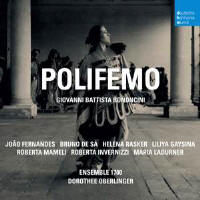Texte paru dans: / Appeared in: |
|
|
Outil de traduction (Très approximatif) |
|
|
Reviewer:
David Vickers A temporary reduction of music-making at the Vienna court during the War of the Spanish Succession prompted a group of its musicians led by Bononcini to visit Berlin as guests of Queen Sophie Charlotte – an intellectual polymath and talented musician. According to the eyewitness Telemann, in summer 1702 she played harpsichord in the first performances of Bononcini’s new one-act opera Polifemo at her new palace, Lützenburg (posthumously renamed Charlottenburg). As well as several roles sung by aristocratic dilettantes, the allstar band included the Bononcini brothers, the theorbist Conti and the string player and composer Ariosti – who regarded his own libretto as ‘gallimaufry’. The tale of Acis, Galatea and Polyphemus is jumbled up with another Ovidian legend of Glaucus’s unrequited desire for the aloof nymph Scylla; the fisherman seeks help from the jealous sorceress Circe, whose trick potion transforms Scylla into an ugly monster; Venus intervenes to restore Scylla’s beauty (on condition that she accepts Glaucus), and then shortly afterwards the goddess intervenes again to bring the murdered Acis back to life – no metamorphosis to a stream on this occasion, but a full-blown resurrection. Dorothee Oberlinger and Ensemble 1700 deftly bring dramatic characters and situations to life in this live recording of a staged production in the Orangery at Sanssouci (the original theatre at Charlottenburg is long gone; Frederick the Great was Sophie Charlotte’s grandson). There are a few momentary blemishes in balance and vocal tuning but there is plenty to admire about Bononcini’s imagination and skill. Glaucus’s naivety at Circe’s deception is depicted in Helena Rasker’s premature anticipation of amorous bliss. The sorceress’s anticipation of cruel revenge is sung by Liliya Gaysina with gleeful jauntiness. One cannot help feeling sorry for Roberta Mameli’s deceived Scylla as she yearns for immortality in the intimate ‘Che più bramar potrò’ (one of many continuo arias featuring obbligato cello), and her tearful lament upon the cruel metamorphosis into a monster (‘Soccorete e non tardate’, with oboe and bassoon). Maria Ladurner’s blithe Venus puts things right in a little aria accompanied by lively cello figurations. Acis and Galatea’s mutual adoration is expressed sweetly in a chamber duet (‘E cara la pena’). Acis’s melancholic love song ‘Partir vorrei’ is sung tenderly by high countertenor Bruno De Sá; elsewhere, his dulcet upper range and florid agility are extraordinary. Galatea’s feigned affection for Polyphemus (‘Quanto penosallo, amore’) exploits rustic droning bassoon and oboe, and her showpiece ‘Cor contento fra catene’ is sung brilliantly by Roberta Invernizzi (and features folk-like virtuosity from violinist Katya Grüttner). The volatile Cyclops is acted wittily by João Fernandes; his promise that he will give Galatea ten cows, eight calves, five pigs, more than two hundred rams and four hundred geldings has lopsided exuberance (‘Dieci vacche, otto viteli’). The murder of Acis, everyone’s reactions and Venus’s second intervention get short shrift – they all occur perfunctorily in a stretch of recitative followed directly by the final chorus, although a duet presenting Scylla and Glaucus’s reactions to Acis’s death has been cut. |
|




